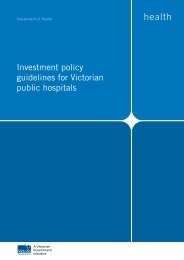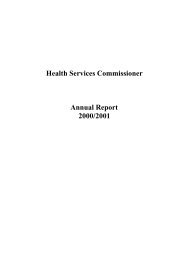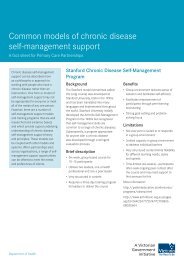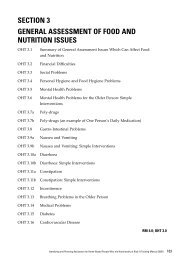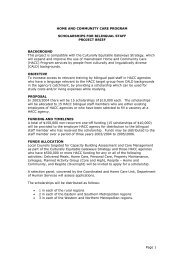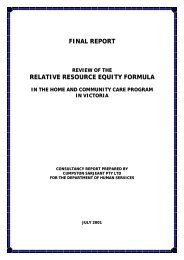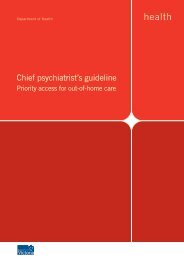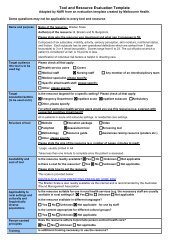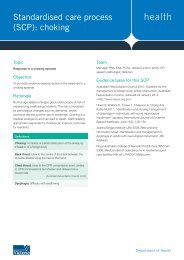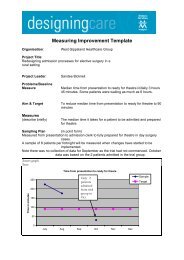Chief Psychiatrist's annual report 2008-09 - Department of Health
Chief Psychiatrist's annual report 2008-09 - Department of Health
Chief Psychiatrist's annual report 2008-09 - Department of Health
Create successful ePaper yourself
Turn your PDF publications into a flip-book with our unique Google optimized e-Paper software.
<strong>Chief</strong> Psychiatrist’s <strong>annual</strong> <strong>report</strong> <strong>2008</strong>–<strong>09</strong> 21<br />
The <strong>of</strong>fice responded to 1,538 recorded contacts in <strong>2008</strong>–<strong>09</strong>, a 50 per cent increase over 2007–08.<br />
Some <strong>of</strong> this variation, such as the number <strong>of</strong> enquiries more than doubling, may be attributable to<br />
more rigorous recording by the <strong>of</strong>fice <strong>of</strong> contacts using the data management system introduced in<br />
2007. There was a moderate increase in the number <strong>of</strong> complaints received. There was a significant<br />
increase in the number <strong>of</strong> requests for clinical advice and in the number <strong>of</strong> incidents <strong>report</strong>ed to<br />
the <strong>of</strong>fice by area mental health services and the <strong>Department</strong> <strong>of</strong> <strong>Health</strong>. The latter were typically<br />
<strong>report</strong>ed to the Office <strong>of</strong> the <strong>Chief</strong> Psychiatrist for information only, with follow-up action in the<br />
wake <strong>of</strong> the incident being progressed through established internal processes in the health service.<br />
The greatest number <strong>of</strong> contacts were made by service providers (29 per cent—down from<br />
33 per cent in 2007–08). Consumers accounted for another 25 per cent <strong>of</strong> contacts, as did<br />
carers and families, constituting a slight increase for consumers and a slight decrease for carers<br />
and families when compared to the previous year. Eight per cent <strong>of</strong> contacts were made by<br />
members <strong>of</strong> the public.<br />
The number <strong>of</strong> contacts made by phone further increased, from 70 per cent in 2007–08 to<br />
76 per cent in the <strong>report</strong>ing period. The remaining contacts were made in writing.<br />
3.2 Complaints<br />
Every effort is made to resolve complaints by telephone without the consumer or complainant<br />
needing to put their complaint in writing. This generally provides a speedier and more personal<br />
response for the complainant, especially where the concern is a current treatment matter, as they<br />
frequently are. Where the issue is more complex, the complainant is asked to provide written details<br />
to enable further investigation. In the <strong>report</strong>ing period, 82 per cent <strong>of</strong> complaints were made by<br />
telephone (up from 70 per cent in 2007–08); the remaining 18 per cent in writing.<br />
Most complaints are addressed through liaison and negotiation with the relevant mental health<br />
service or clinician, <strong>of</strong>ten to reconnect the consumer or relative and the service or clinician so<br />
that their concerns can be discussed and addressed. Many complaints are about differences <strong>of</strong><br />
opinion regarding the need for mental health care, or the manner in which treatment has occurred,<br />
with consequent impact on the consumer–clinician relationship. For mental health consumers this<br />
relationship is especially important since, unlike the general health care system, they are required<br />
to receive their treatment from the area mental health service responsible for the catchment area in<br />
which they live.<br />
The <strong>Chief</strong> Psychiatrist may write to the authorised psychiatrist <strong>of</strong> a service requesting a clinical<br />
<strong>report</strong> to assess the treatment and care provided. In a small number <strong>of</strong> cases, the <strong>Chief</strong> Psychiatrist<br />
will personally meet with the patient, review the case and provide recommendations to assist in<br />
reaching a satisfactory outcome for the complainant. A formal direction may be made in instances<br />
where less formal approaches fail to achieve a resolution or desired action. In practice, this is<br />
seldom necessary. A complaint is closed when the <strong>Chief</strong> Psychiatrist decides that all steps have<br />
been taken to resolve the issue. Where the interaction has been protracted, or the issues complex,<br />
the <strong>Chief</strong> Psychiatrist’s opinion and decision will be conveyed to the complainant in writing.



